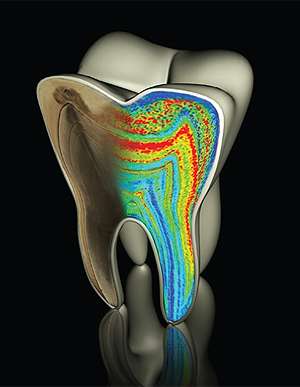Researchers uncover breastfeeding timeline in Neanderthal tooth

Maternal milk is fundamental to the health of newborns, but how has this crucial feature of early childhood development evolved in primates?
In a major breakthrough, published today in the prestigious scientific journal Nature, researchers from the University of Sydney, the University of Technology (UTS), Icahn School of Medicine at Mount Sinai and Harvard University, have developed a method that can be applied to fossil samples to uncover their breastfeeding habits.
Their method has shown that consumption of maternal milk and then later transition to non-milk foods leaves an imprint in teeth, an imprint that can be uncovered using sophisticated lasers and microscopes many years after the event.
Paper senior author, Dr Manish Arora from the University's Institute of Dental Research, worked with paper lead authors, Dr Christine Austin and Dr Tanya Smith from the US, to test the validity of the imprint in modern samples over several years.
"We used teeth from monkeys with known nursing histories and then confirmed our findings in children who had been studied for about eight years," Dr Arora said.
It was after this long road of scientific discovery that the researchers were convinced that their method worked, and to prove it, they applied their technique to a Middle Paleolithic Neanderthal tooth that was unearthed in Belgium.
"It was the intersection of several disciplines, including analytical chemistry, dentistry and evolutionary biology that made this discovery possible," Dr Arora said.
Dr Austin said human dietary sources leave an imprint that can be recovered after many years in tissues like tooth enamel that remain stable for long periods.
"Identifying early life dietary shifts is essential to understanding life history evolution, however, reliable biomarkers for both living species and fossil primates have been largely unavailable until now," she said.
"Dietary patterns in our early life have far reaching consequences for our health, and are also a major feature that distinguishes us from other primates. It appears that we are what we eat, even thousands of years after the fact."
More information: www.nature.com/nature/journal/ … ull/nature12169.html
Journal information: Nature
Provided by University of Sydney



















